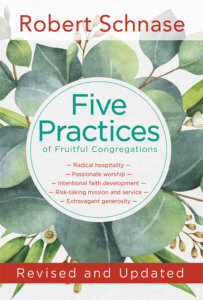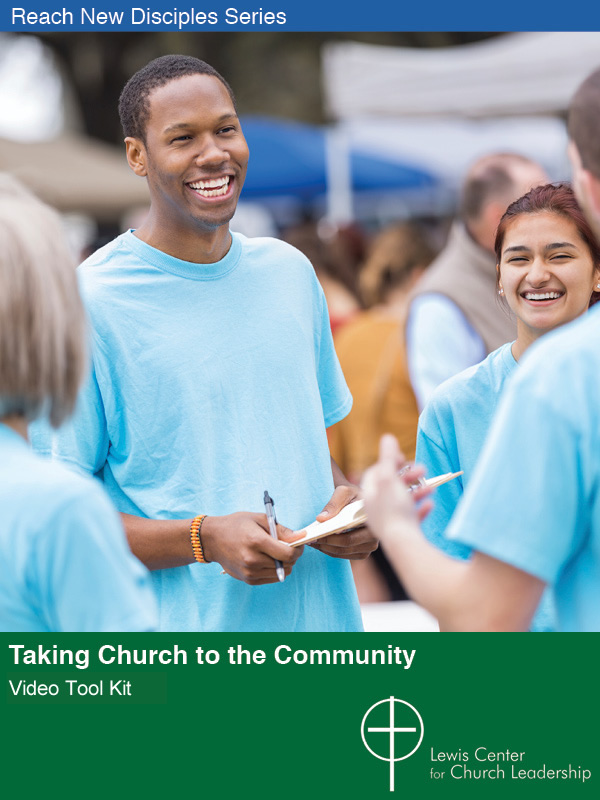Robert Schnase’s five key practices — radical hospitality, passionate worship, intentional faith development, risk-taking mission and service, and extravagant generosity — have helped thousands of congregations be more fruitful in ministry. In 2018, Schnase reframed these key practices to move beyond attractional assumptions and address the more challenging realities churches face today.
To celebrate the Lewis Center’s anniversary, we are highlighting Leading Articles — some of our most popular posts of the past 20 years. We are pleased to share again this article by Robert Schnase, originally published on October 17, 2018.
Why do we assume that people who do not know our congregation will one day find themselves as a member of our church? Most congregations, consciously or unconsciously, operate with attractional assumptions. They imagine that a person, couple, or family becomes aware of their church, perhaps through the invitation of a friend, an advertisement on a billboard, or by driving past the sanctuary. Churches then hope that what the new persons hear or see will draw them toward the congregation. They assume that the visitors will share a common interest in the purpose of the church or feel a desire to form an affinity with the church. A yearning to learn, grow spiritually, belong, and serve will cause them to visit and will lead them to greater participation. We assume this is the pathway for entry into the church because it matches the experience of many people who currently belong.
Why the attractional model is no longer enough
Attractional models worked in the past when the culture expected people to attend worship and people wanted to be members of churches. What happens when people no longer trust institutions in general or the church in particular? Or when next generations don’t share a taste for the style of music we offer in worship and don’t appreciate the one-way verbal communication of a sermon? Becoming a member of anything is unappealing to many people and does not motivate them to deepen their spiritual lives. They are not seeking to join anything. Many churches are surrounded by neighbors who speak a different language or who are of a different ethnicity than the majority in the congregation. What would cause them to show up for worship?
What happens when generations of people living around us have no experience with worship, no vocabulary for understanding faith, no familiarity with scripture, and have never once stepped inside a church? The culture provides an ever-increasing number of competing activities on Sundays that are more compelling than church attendance. When people do not find the idea of church appealing, they are not attracted to what we do, no matter how well we do it.
A significant shift
What is required is a significant shift in how we think about ministry:
- “Come to us” ideas must be balanced with “go to them” initiatives.
- Strategies for doing things “better” must be strengthened with ideas of doing things “differently.”
- Teaching people to “do things our way” must be intermixed with “learning new things” from others.
- Doing ministry “for” becomes doing ministry “with.”
- Welcoming the guest expands to becoming a newcomer among others.
- Increasing activities “in the church” shifts toward offering ministries “beyond our facilities.”
- Making our church more interesting to others expands to becoming more interested in the spiritual needs and real-life issues of others.
- Receiving people in the spirit of Christ expands to being sent to people around us in the spirit of Christ.
The new five practices
The original Five Practices of Fruitful Congregations relied on attractional assumptions. Today, fruitful congregations have discovered that while attractional models are helpful and necessary to fulfill the mission of Christ, they simply are not enough. Faith communities must also develop ministries that derive from missional assumptions, activities that primarily benefit people who are not members of the church, often in places far away from their facilities. These ministries require a different posture toward our neighbors, a more deliberate outward focus, and a willingness to carry Christ’s love to where people already live and work and play, rather than hoping for people to come to us.
1. Radical hospitality
Radical hospitality is not merely focused on getting people to come to church. Rather, it focuses with greater intentionality about how we carry hospitality with us into our neighborhoods, work life, and affinity networks. What good is Christian hospitality if it’s something we only practice for an hour on Sunday morning while failing to form relationships with people who live next door?
2. Passionate worship
Passionate worship extends beyond improving what happens on Sunday morning in the sanctuary. Worship becomes mobile, portable, on the move, going where people live, and work, and play.
3. Intentional faith development
Intentional faith development includes more focus on experiential learning, mentoring, spiritual formation, and forming relationships in addition to traditional content-based education in Bible studies and Sunday school classes.
4. Risk-taking mission and service
Risk-taking mission and service explores relationships more deeply and offers examples of shifting from doing ministry for to less patronizing, more relational models of doing ministry with those who suffer hardship or injustice.
5. Extravagant generosity
Extravagant generosity involves helping people learn to love generosity as a way of life not just a way of supporting the church.
This shift of energy, focus, and imagination is life-giving. When the church leaves the building to offer ministries that matter, we view ourselves as part of Christ’s mission in a whole new way, as sent into a mission field uniquely prepared by God that uses the talents, gifts, and relationships God has given us.
 This material is excerpted from Five Practices of Fruitful Congregations, Revised and Updated (Abingdon Press, 2018) by Robert Schnase. Used by permission. The book is available at Abingdon Press, Cokesbury and Amazon.
This material is excerpted from Five Practices of Fruitful Congregations, Revised and Updated (Abingdon Press, 2018) by Robert Schnase. Used by permission. The book is available at Abingdon Press, Cokesbury and Amazon.
Related Resources
- Ministry Beyond the Wall: Revisiting the Five Fruitful Practices, a Leading Ideas Talks podcast episode featuring Robert Schnase
- Taking Church to the Community, a Lewis Center video tool kit resource
- The Challenge of Fruitfulness by Robert Schnase
- Review of Five Practices of Fruitful Congregations by Robert Schnase







